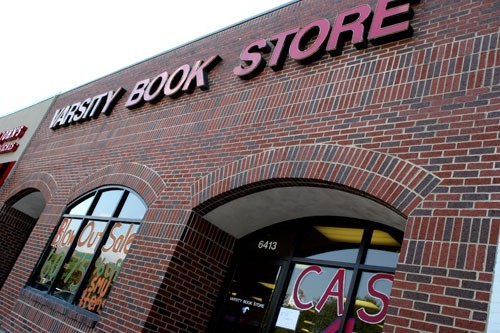
SMU Bookstore gains monopoly with the closing of Varsity (Photo by John Schreiber, The Daily Campus)
Local bookstore competition for students is over.
After more than 50 years of serving the SMU community as an alternative textbook source, Varsity Book Store will be closing it doors forever mid-May because of its inability to develop a close relationship with the university.
Some students are worried about how this will affect the amount of money they spend on books.
Prem Pamchal, an economics and finance major, views the loss of the Varsity Book Store as a detriment to students. “The loss of competition for SMU students will drive the overall prices of books up,” he said.
Varsity Book Store officials, SMU Barnes and Noble Bookstore’s rival located on Hillcrest Avenue, say SMU administrators took a series of actions that helped put Varsity Book Store out of business.
The first competitive step SMU Bookstore took was in the late-80s when it began an exclusive partnership with Barnes and Noble. The contract offered both parties a larger profit margin and a way to keep operating costs down.
Sue Riedman, a representative of the company that owns Varsity Book Store, believes SMU’s exclusive contract with Barnes and Noble has played a significant part in the demise of Varsity.
“It’s unfortunate because it’s limiting competition, taking away another source of books for students, really limiting the price that students are going to have to pay for their books and leaving it up to the campus bookstore to determine that price,” said Riedman, vice president of corporate communications for Nebraska Book Company.
But Julie Wiksten, director of auxiliary services at SMU, feels that Varsity Book Store didn’t compete with Barnes and Noble.
“To my knowledge the Varsity Book Store has always been there, but in terms of square feet and what they stock, they just can’t compete with a full service operation like Barnes and Noble,” she said.
Though the Varsity Book Store’s property rent is expensive because its prime location, property owner and Varsity Book Store founder Hubert Burgess said it boils down to basic business.
“They can’t sell enough to pay for operations these days,” he said.
The company is not downsizing according to Riedman, Varsity Book Store’s financial plight is directly related to local competition.
The second step came in 2000 when SMU Bookstore began offering Pony.
Pony is an SMU-sponsored debit card that parents and students can deposit money into for purchasing conveniences.
Since it’s introduction, Pony express cash revenue has increased $2 million dollars annually, according to director of Park ‘n Pony Mark Rhodes.
In 2001, SMU offered its store another exclusive competitive advantage over Varsity called “charge home.” This allows students to use their Pony card as a credit card that sends the bill home to mom and dad.
SMU has denied Varsity Book Store Pony and charge home contracts, saying it violates the terms and conditions of the university’s agreement with Barnes and Noble.
“It has had a significant impact on the bookstore” Riedman said. “The university has allowed other businesses to use the Pony card, but the bookstore has not been given that same opportunity to use the Pony card.”
But Riedman said she understands why SMU hasn’t.
“It’s because we’re competing with B&N and for them to offer us Pony would have a negative impact on commissions they receive”
Varsity Book Store manager Sara Atwell agreed.
“The Pony offers an advantage; it’s very convenient,” she said. “This is a convenience-based world.”
One convenience SMU Bookstore has is its close relationship with the faculty.
Every semester, the bookstore sends a formal letter to each faculty member requesting a detailed book list for his or her upcoming classes. Most professors respond to it.
In contrast, Varsity Book Store sends a similar letter, but receives a significantly smaller number of replies.
“It has to do a lot with booklists and textbooks,” Riedman said. “The real challenge at SMU is gaining access to the booklist. Without access we can’t determine which books to stock in the store.”
Riedman estimates about 65 percent of Varsity Book Store’s sales are from textbooks. The rest is from the sales of school supplies and clothing merchandise.
One advantage the Varsity Book Store has is it carries law school merchandise that the SMU Bookstore does not.
Allison Snow, a law student, bought a SMU law school t-shirt for her niece at Varsity Book Store, a shirt she could not find at the SMU bookstore.
“I know a lot of law school students went there as opposed to Barnes and Noble because they sold SMU Law School clothing and books,” she said.
Fifty years ago, Varsity opened as an alternative bookstore for all SMU students with the help of a business school professor.
Burgess, who was completing his master’s from the business school at the time, opened Varsity Book Store in 1950 under the guidance of professor Trent C. Root.
At the time, the school welcomed competition, Burgess said.
“He [Root] thought that students should have an alternative, and recently, a lot has changed,” he said.









